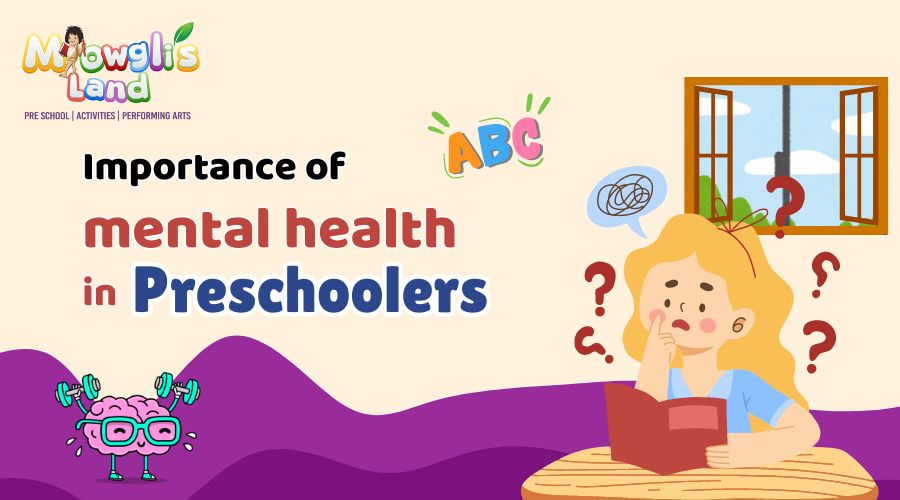It’s easy to overlook the mental health of young children, often attributing their behaviours to “just being a kid.” However, the foundation for emotional well-being lies in the early years. Preschool is a crucial period of development when children are rapidly learning about themselves, their world, and their relationships.
Want to make sure your child is mentally healthy? In this blog, we’ll know the importance of mental health in preschoolers and how to nurture it at the best preschool near me
Why Mental Health Matters in Preschool?
A strong mental foundation in early childhood has far-reaching implications for your little one’s overall well-being. The benefits extend beyond the preschool years and into adulthood:
- Academic Success: Children with good mental health are more likely to excel in school. Emotional regulation, social skills, and cognitive development are essential for academic achievement.
- Stronger Relationships: Healthy emotional development fosters strong and meaningful relationships with family, friends, and peers. These connections provide support and contribute to overall happiness.
- Improved Physical Health: Mental and physical health are interconnected. Children with good mental health are more likely to engage in healthy behaviors and take care of their bodies.
- Lifelong Well-being: A strong foundation in early childhood sets the stage for a happy and fulfilling life. Kids with good mental health are better equipped to handle life’s challenges and build resilience.
-
The Building Blocks of Mental Health
Mental health in preschoolers consists of a broad aspect that includes emotional, social, and cognitive abilities. These building blocks are essential for their holistic development:
- Emotional Regulation: The ability to identify, understand, and manage emotions effectively is crucial. It helps children navigate the ups and downs of early childhood and develop healthy coping mechanisms.
- Social Skills: Building strong relationships with peers, family, and caregivers is vital for a child’s academic, social, and emotional growth. Sharing, cooperating, and empathy are basic social skills acquired during these early years.
- Cognitive Development: Curiosity, problem-solving, and learning are cognitive milestones that lay the foundation for future academic success. A stimulating environment fosters intellectual growth and curiosity.
- Self-esteem: A positive sense of self-worth is essential for a child’s confidence and resilience. Encouragement and praise play a vital role in building self-esteem.
-
Signs of Mental Health Challenges
While it’s natural for preschoolers to experience mood swings and tantrums, certain signs may indicate underlying mental health challenges:
- Excessive Fear or Anxiety: Persistent fear, nightmares, or avoidance of specific situations can be signs of anxiety.
- Withdrawal: Loss of interest in activities, social isolation, or changes in behavior may indicate underlying issues.
- Aggression: Frequent tantrums, physical aggression toward others or themselves, or difficulty controlling impulses can cause concern.
- Changes in Appetite or Sleep: Significant changes in eating or sleeping patterns may signal emotional distress.
- Difficulty Concentrating: Persistent problems focusing, following instructions, or completing tasks can indicate underlying challenges.
If you notice these signs persisting, seeking professional help is essential. Early intervention can make a significant difference in a child’s life.
Also read: Problem-solving tips for preschoolers
-
Nurturing Mental Health in Preschoolers
Parents and caregivers play a vital role in fostering their child’s mental health. Here are some practical tips:
- Create a Safe and Loving Environment: A nurturing and secure home environment provides a strong foundation for emotional well-being.
- Encourage Emotional Expression: Encourage kids to recognize and handle their emotions in healthy ways. Validate their feelings and offer support.
- Build Strong Relationships: Spend quality time with your child by engaging in activities they enjoy. Strong relationships foster emotional security.
- Set Clear Limits and Consequences: Consistent boundaries help children develop self-discipline and understand expectations.
- Teach Problem-Solving Skills: Equip children with tools to handle challenges independently and build resilience.
- Model Healthy Behavior: Children learn by observing adults. Demonstrate healthy coping mechanisms and emotional regulation.
- Seek Support: Don’t hesitate to reach out to professionals for their guidance and support.
-
The Role of Preschools
Preschools play a crucial role in supporting children’s mental health. They provide opportunities for social interaction, learning, and emotional development. Look for preschools that prioritize:
- Qualified Staff: Teachers trained in child development and mental health can create a nurturing learning environment.
- Positive Learning Environment: A safe, stimulating, and inclusive atmosphere promotes emotional well-being.
- Social-Emotional Learning: Programs that focus on building emotional intelligence and social skills are essential.
- Collaboration with Parents: Open communication and family partnerships are vital for a child’s holistic development.
By understanding the importance of mental health in preschoolers and taking proactive steps with us at Mowgli’s Land, we can equip children with the tools they need to thrive. Remember, seeking help is a sign of strength and not weakness.
If you have concerns about your child’s mental health, don’t hesitate to reach out to a paediatrician or mental health professional!




